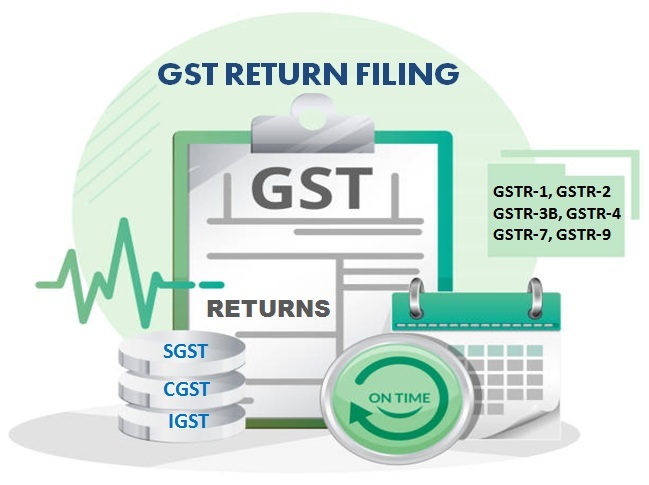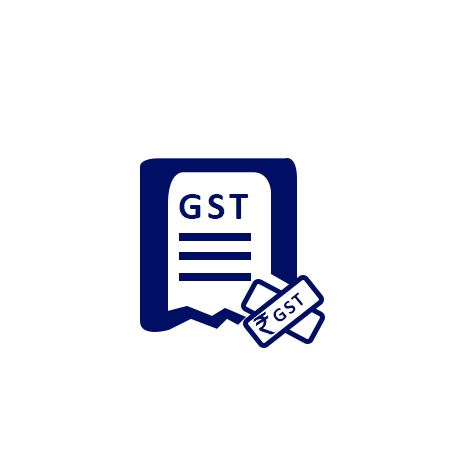- Home
- Business Registrations
Tax Registrations
Other Registrations
Safeguard Registrations
Other Registrations
Safeguard Registrations
- Compliance Services
Labour Laws Compliances
- DSC
- Incentives
- Business Closure
- Other Services
- Blogs
An overview:
The introduction of GST is truly a game changer for Indian Economy as it has replaced multi-layered, complex indirect tax structure with a simple, transparent and technology driven tax structure. Goods and Service Tax (GST) is an indirect tax which is introduced in India on 1stJuly 2017 to replace a host of other indirect taxes such as Value Added Tax, Service Tax, Purchase tax, excise duty, Luxury Tax, Entertainment tax, Entry Tax, Special Additional Duty of Customs, etc.Before the introduction of GST, the Centre and State used to collect the tax separately. However, GST replace all the other taxes. Levying GST eliminated the cascading effect of taxes on the Indian economy. Removal of the cascading effect has impacted the cost of goods. By eliminating cascading effect of taxes and reducing transaction costs, it enhances the ease of doing business in the country. Under GST, Tax is collected through a defined process. Each business in supply chain takes part in the process of controlling and collecting the tax, remitting the proportion of tax corresponding to its margin, i.e., on the difference between tax imposed on its taxed inputs and tax imposed on its taxed outputs. Thus, tax is in principle collected on the “value added” at each stage of production and distribution.GST results in “ONE NATIONS, ONE TAX, ONE MARKET”.


⇒ Sale in other States-
If any person wants to supply goods between two states i.e. from one state to another state then GST Registration is mandatory under the Goods and Service Tax (GST).
⇒ Procuring Government Contracts-
GST registration is mandatory if you are the Contractor or Equipment Supplier who deals with the Government Department and wants to procure the Government Contracts. They must do the GST compliances in order to procure the contracts of Government.
⇒ Mandatory Requirement in GST Law:
⇒ Sales/Turnover Exceeds specified Limits
GST Registration becomes mandatory if a person or entity sells goods or services beyond a certain turnover: Given below is the threshold limit:
Service Providers: Any person or entity who provides service of more than Rs.20 lakhs in a year is required to obtain GST registration.
Supplier of Goods: Any person who is engaged in the exclusive supply of goods whose aggregate turnover crosses Rs.40 lakhs in a year is required to obtain GST registration.
⇒ E-Commerce Business
To sell your product or services online on various platforms like Amazon, Flipkart, Snapdeal, Zomato, Swiggy, etc., there is the mandatory requirement for the GST Registration. Thereby GST Registration will allow you to do the online business on various platforms.
CGST is charged on the intra state supply of goods and services. It is governed by the CGST Act. The revenue earned through the CGST is collected by the Central Government.
SGST is charged on the the intra state supply of goods and services within a state. It is governed by the SGST Act. The revenue earned through the SGST is solely claimed by the respective state Government.
IGST is charged on the inter-state transactions of goods and services. It also applies to imports as well as exports. Under the IGST, the taxes charged are shared by both the Centre and the state. The SGST part goes to the state wherein the goods and services are consumed. It is governed by the IGST Act.
UTGST is levied on the supply of goods and services in any of the Union Territories in the country, viz. Andaman and Nicobar Islands, Daman and Diu, Dadra and Nagar Haveli, Lakshadweep, and Chandigarh. UTGST is levied along with CGST. It is the counterpart of the State Goods and Service Tax (SGST) which is levied on the supply of goods or services in the Union Territories (UTs) of India.
![]()
Eliminates Cascading Effect of Tax
Cascading tax effect is also termed as “tax on tax”. Cascading effect means when the same good is taxed many times from the stage of production till the stage it is finally sold out to the consumer. As a result of this, the burden to pay the multiple taxes ultimately beard by the consumer and such situation leads to inflationary prices. By eliminating cascading effect of taxes and reducing transaction costs, it enhances the ease of doing business in the country.
![]() E-Commerce Business
E-Commerce Business
To sell your product or services online on various platforms like Amazon, Flipkart, Snapdeal, Zomato, Swiggy, etc., there is the mandatory requirement for the GST Registration. Thereby GST Registration will allow you to do the online business on various platforms.
![]() Input Tax Credit
Input Tax Credit
Entities having GST registration are eligible to collect GST from customer for the supply and offset the liability against GST taxes paid while purchasing various goods and services. Hence, GST registration can help you save on taxes and improve margins.
![]() Composition Scheme for small businesses
Composition Scheme for small businesses
Under GST, small businesses (with a turnover of Rs 20 to 75 lakh) can benefit as it gives an option to lower taxes by utilizing the Composition scheme. This move has brought down the tax and compliance burden on many small businesses.
![]() Simple and Easy Online Procedure
Simple and Easy Online Procedure
Simple tax regime leading to easy tax compliances. Fewer rates with fewer exemptions will lead to simplification and uniformity.
![]() Easy of Doing Business
Easy of Doing Business
GST will lead to reduction in compliance costs as multiple record-keeping for a variety of taxes will not be needed, therefore lesser investment of resources and manpower in maintaining records. GST results in simplified and automated procedures for various processes such as Registration, Returns, Refunds, Tax payments. All interaction shall be through the common GST Portal, therefore less public interface between the taxpayer and the tax administration.
![]() Creating Good Self Impression
Creating Good Self Impression
Some businesses voluntary register themselves under GST as it created a good self-impression that their annual taxable supply exceeds the prescribed limit.
![]() Benefit to Consumers
Benefit to Consumers
Reduction in prices of goods due to elimination of cascading effect provide a big relief and advantage to consumers as it leads to more savings.
![]() Bank Loans
Bank Loans
GST registration and GST return filing serve as proof of business activity and create track record for a business. Banks and NBFCs lend to businesses based on GST return data. Hence, GST registration can help you formalize your business and get credit.

Among all, the first step involved for the process of company incorporation is ascertaining the availability of name. A company is identified through its name it registered on the Ministry of Corporate Affairs. Hence choosing an appropriate name is the important and crucial thing.
For the same, an application will be submitted for the reservation of name to the Ministry of Corporate Affairsby login to the sitehttps://www.mca.gov.in/mcafoportal/login.do and preference wise 2 names along with the business objective can be provided. Once the name gets approved, it’s reserved for 20 days within which applicant needs to complete all the remaining process for the incorporation of the Company.
Stakeholders shall ensure that the proposed name selected does not contain any word as prohibited in Section 4(2) & (3) of the Companies Act, 2013 read with Rule 8 of the Companies (Incorporation) Rules, 2014.Points to be considered while suggesting the name:
-Check Trademark for your proposed name on the site https://ipindiaonline.gov.in/tmrpublicsearch/frmmain.aspx
– Check domain for your proposed name on the site https://www.registry.in/index
-Check the availability of Company Name on the site https://www.mca.gov.in/mcafoportal/viewCompanyMasterData.do
Therefore, choosing an appropriate name which does not prohibit any law will be the most important thing.
There is also another way to finalize the name of company and its incorporation in one go i.e., apply name and company incorporation together. However, if the same has been rejected by the MCA, then all the documentation will be done again
Once the name gets approved in PART A, the basic details will be automatically filled in all linked forms of PART B. There will be total 4 linked forms which will be generated such as AGILE-PRO, Spice+ MOA, Spice + AOA and INC-9. These linked forms will be filled up with the necessary details like capital subscription, name of shareholders and directors, percentage of holding among the shareholders, Interest of shareholders in other entities, etc.
For completion of the Part B, many other details and documents will be required which is discussed as below:
For the E-filing of all the forms, Digital Signature is a mandatory requirement. Digital Signature is in form of digital key containing all the information about the registered signatory like name, address, Contact No, Email ID and the authority detail which has provided the certificate. All the forms will signed digitally by the authorized signatory by proving its identity through the Digital Signature Certificates.
Director Identification Number is a unique identification number of 8 digits for the directors of a Registered Company.Every director will be provided a unique number with which he will be identified by the MCA. To become a director, one shall apply for getting the DIN from the MCA.To applying DIN, the applicant has to make an application in e-Form DIR-3 and shall follow the below mentioned process
This form is for GSTIN, Employees Provident Fund Organization registration, Profession Tax Registration, Opening of Bank Accounts, Shops and Establishment registration.
It is mandatory to register for ESIC, EPFO, Professional Tax (for Maharashtra) and bank account opening to obtain AGILE-PRO via e-form, However, GSTIN Registration is optional for the applicants.
MOA is a document which contains all the fundamental information about the company, the objectives of the company in brief, the share capital, type of Shares whether equity or preference and its shareholders details, details of allocation of shares among the shareholders along with their name, address and occupation, etc. Company can perform and undertake only those activities that are mentioned in the objectives of Memorandum of Association beyond which the company cannot undertake any other objective but the Memorandum of Association (MOA) can be amended with the approval of the shareholders.
As per Section 4 of the Companies Act, 2013, Companies shall form MOA as specified in Tables A to E of Schedule -I of the Act. Below is the list of tables with their meaning:
Table A: Company Limited by shares
Table B: Company limited by guarantee and not having a share capital
Table C: Company limited by guarantee and having a share capital
Table D: Unlimited Company and not having share capital
Table E: Unlimited Company and having share capital
Hence Company shall adopt an appropriate table applicable to it as there are various forms of tables for different companies.
AOA defines the rules and regulations that govern the internal management of the company for achieving its objectives.
Various forms in Tables F to J for different companies have been mentioned under Schedule I of the Companies Act 2013 and AOA must be in the respective form.
Table A: Company Limited by shares
Table B: Company limited by guarantee and having a share capital
Table C: Company limited by guarantee and not having a share capital
Table D: Unlimited Company and having share capital
Table E: Unlimited Company and not having share capital
Declaration shall be given by the subscribers and directors in the form INC-9 that:
Once all the above documents and details are ready, then the application for the incorporation of the company can be made via e-form Spice accompanied by Spice MOA and Spice AOA with the registrar under whose jurisdiction the address of the company is located. All these e-forms need to be affixed by the Digital Signatures of the respective persons.
The Registrar of Companies will grant a Certification of Incorporation along with the Copy of PAN, TAN, EPF, ESIC which will be used as for the identity of the company existence.
Once the company gets incorporated then there are many compliances which need to be performed by the company
The Company within thirty days of its incorporation shall furnish to the Registrar of Company regarding verification of its registered office by filing the e-form INC-22.
INC-22 shall be downloaded from the Ministry of Corporate Affairs site and any of the following document will be attached with this form:
Every Company incorporated shall within 180 days of its incorporation shall file the declaration for the Commencement of the Business with the Registrar of Company. It is the declaration regarding that all the subscribers to the MOA have deposited the total value of the shares agreed to be taken by them in the Company Bank Account. Proof for the same shall be attached while filing the form INC-20A. Bank Statement shall be used as the evidence for the same.
COMPLIANCESPRO has a separate team which is expert in completing this complex process very easily and helps you to get the company registered within 3 daysonly in a very reasonable price.


We are an organized team of experienced CA, CS and Lawyers, duly supported by a pool of trained staff helping aspiring Entrepreneurs throughout India and providing professional services at the most reasonable fee with complete transparency and helping them to grow by taking their whole burden of all kinds of compliances so that they can focus on their business only.
We are an organized team of experienced CA, CS and Lawyers, duly supported by a pool of trained staff helping aspiring Entrepreneurs throughout India and providing professional services at the most reasonable fee with complete transparency and helping them to grow by taking their whole burden of all kinds of compliances so that they can focus on their business only.
©2022. Compliances Pro. All Rights Reserved.